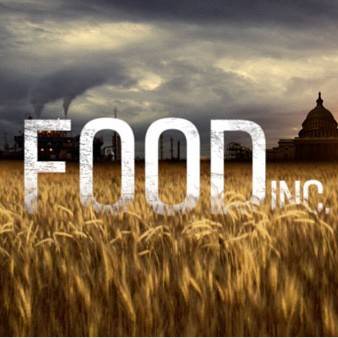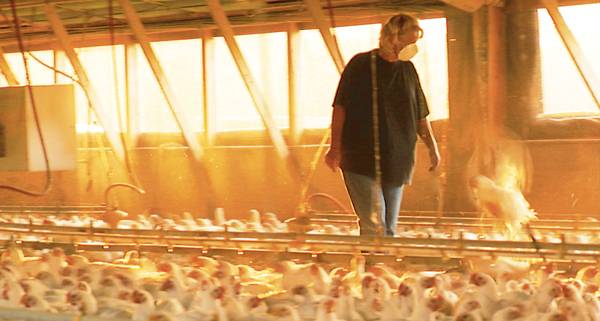 Robert Kenner’s Food, Inc. has been getting a lot of attention recently in the blogging world. “Healthy living” bloggers (a subset of food bloggers) have been flocking to movie theaters across the country to see this documentary about the evils of the United States’ corporate food industry. Given that central Illinois is in the heart of said industrialized agriculture, I was surprised to see “Food, Inc.” on the marquee at Boardman’s Art Theater. Though I generally have a policy of only seeing movies that are escapist fantasies, I figured that I should listen to all the blog-o-sphere hype and catch this documentary before it was whisked out of town on Friday.
Robert Kenner’s Food, Inc. has been getting a lot of attention recently in the blogging world. “Healthy living” bloggers (a subset of food bloggers) have been flocking to movie theaters across the country to see this documentary about the evils of the United States’ corporate food industry. Given that central Illinois is in the heart of said industrialized agriculture, I was surprised to see “Food, Inc.” on the marquee at Boardman’s Art Theater. Though I generally have a policy of only seeing movies that are escapist fantasies, I figured that I should listen to all the blog-o-sphere hype and catch this documentary before it was whisked out of town on Friday.
I left the movie with a broad range of emotions: guilt, anger, frustration, with both the content of the documentary as well as the ways in which the filmmakers tried to get their message across. Having entered the theater knowing very little about the movie, the boyfriend told me afterwards that he would have rather not seen it at all. It has taken me a few days to process the overwhelming amount of information in “Food, Inc.” so instead of a full-fledged review, I will provide a “Pros and Cons” list about the movie.
Pro: Food, Inc. is eye opening. (And if you were already aware of the practices of the food industry, it will probably reinforce your beliefs about them.) Rather than simply hitting you over the head with heart-wrenching footage of animals taken slaughter, Food, Inc. delves deeper into the corporate side of the food industry. It explains the clever marketing of our food with traditional agrarian imagery (farmhouses, green pastures, gingham print, etc.). In truth, the majority of our food and food products no longer come from these green pastures and from the sunburned hands of corn-fed farmers. Instead, our food may be manipulated with chemicals, hormones, and other sundry products before being passed down through a mechanized assembly line to be packaged and sent to grocery stores hundreds of miles away. I have not yet fleshed out my actual stance on all of this processing, but I do think that American consumers should be aware of what goes into our food and be allowed to make informed decision about what we put in our mouths.
Pro: The imagery of the meat industry is not too graphic. Everyone has seen the nauseating PETA promotional material, and I was expecting Food, Inc. to use the same tactics to scare people away from meat products. Fortunately, the filmmakers chose to show poignant aspects of the meat industry, which sent a message but didn’t turn me away from the movie. We see cramped chicken houses with birds that cannot support the weight of their genetically modified bodies. (The film tells us that chickens have been engineered to grow faster and to have larger breasts to support our consumption habits.) We also see cows and pigs crowded into dirty pens, ankle-deep in their own manure, and hidden footage of the dangerous meatpacking plants. Without a doubt, these images are depressing and compelling, but we are mercifully spared the most gruesome footage. While I may be a coward for avoiding the detestable aspects of the meat industry, I think that the documentary did a good job of exposing many problems, without trying to convince me with revolting images alone.

Con: Food, Inc. tries to take on far too much at one time, to the detriment of its main message. Clearly, there are many issues that need to be discussed in the food industry, and though I appreciate the filmmakers’ efforts to expose as many of these as possible in an hour and a half, Food, Inc. began to feel cumbersome and overloaded about halfway through. The film covers a variety of topics, including the history of our current food industry, fast food, government subsidized crops, food-borne illnesses from meat, the predominance of corn, chicken farming, Monsanto’s genetically modified soy beans, and childhood obesity. It also features interviews with Michael Pollan, author of The Omnivore’s Dilemma and In Defense of Food, Eric Schlosser, author of Fast Food Nation, Gary Hirshberg, CEO of Stonyfield Farm, as well as several farmers who voice their opinions from inside the food industry. Each section, treating a separate issue, is clearly demarcated with an animated title, and I began to wonder how many more of these silly graphics I would have to endure.
In the end, you feel overwhelmed by seeing feature after feature of depressing imagery and ultimately, the problems with capitalism. Whether “Food, Inc.” lacks a central message or simply muddies it by trying to take on too many topics, I feel that the filmmakers definitely failed to follow a cardinal rule: less is more.
Con: The film offers no real solution, and I left feeling dissatisfied and guilty. As a grad student, I am painfully aware that eating well takes money. In fact, it takes a lot of money. Obviously, the film caters to a very specific audience, and more than likely, it preaches to the converted that we should try to eat organic, eat local, and take back our roles as active consumers. However, eating well is inherently a class-based luxury. While Food, Inc. does feature a low-income family whose budget forces them to choose potato chips over fruit, it offers no solution to this issue. Even on a grad student budget, I can afford to eat pretty well, but I still left the film feeling both guilty for not doing more and ultimately helpless. I doubt that anything will change if I stop buying bags of frozen chicken breasts at Meijer. And even if I patronize the Farmer’s Market in the summer, how can I eat seasonally in the middle of an Illinois winter? (I’m pretty sure that the only thing that grows in the middle of winter here is depression and heating bills.)
In the end, Food, Inc. exposes several problems, but it offers very few tangible solutions. I am still grappling with my meat consumption and the fact that I buy my groceries from a mega-box store. Certainly, I will continue to go to the Farmer’s Market for some of my produce and perhaps in the future, I can give vegetarianism in a try. In the meantime, however, Food, Inc. made me feel ashamed, overwhelmed, and depressed, rather than energized to make changes in my daily life.








